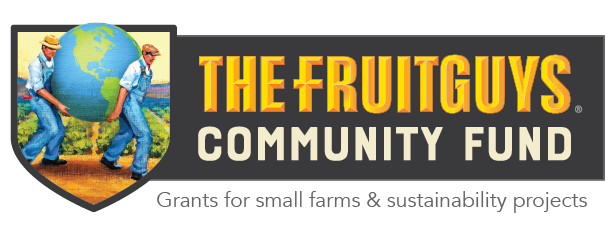A diverse group of women farmers dominate the 2022 class of grantees for The FruitGuys Community Fund, the nonprofit’s 10th year of providing grants to small farms and agricultural nonprofits that have big impacts on their sustainability and their communities. A majority of these 17 farms are owned or led by women who are Black, Indigenous, or People of Color (BIPOC), furthering our goal of providing critical support to under-represented farmers.
We received more than 250 letters of intent this year and there were many notable applicants, making selection a tough choice for our volunteer grant review committee. After two rounds of scoring using the criteria laid out in our farming manifesto, the committee recommended 17 farms and agricultural nonprofits from 11 different states.
These 17 grantees will receive $71,136 in funding, thanks to donors to our Help Farms, Help our Planet campaign and a critical program sponsorship from Aramark. Aramark, the Philadelphia-based food and facilities service provider, specifically supported a group of not-for-profit BIPOC farmers and agricultural projects and has committed to sponsoring a similar number of BIPOC farms for the 2023 and 2024 grant cycles.
Ten Years of Small Grants with Big Impacts
“This class of grantees exemplifies what we founded The FruitGuys Community Fund to do–support small and independent farms and agricultural non-profits that can make big impacts with small amounts of money,” said Chris Mittelstaedt, Founder & CEO of The FruitGuys. “This group also highlights the innovative and creative ways that women farmers approach agricultural and climate change problem solving. If these grants act as a small seed that allows farmers and agricultural leaders to grow larger impact, then we are accomplishing what we set out to do. We are deeply grateful to all those who have contributed over the years to the Fund.”
Introducing The Class of 2022 Grantees
As the year progresses, we’ll hear from these farms how their funding allowed them to complete their sustainability projects, such as adding beehives and pollinator-supporting hedgerows, installing rain catchment and drip irrigation systems, adding growing season extension structures such as a high desert Wallipini, or diversifying their farms by adding livestock. These projects will help them conserve water, soil, energy, and labor while promoting pollination, sustainable climate change mitigation, and harvests that create greater financial stability for their farms and feed more people in their communities. Farms will update us in August and at the end of the year on how their projects are progressing. Sign up to follow along.
2022 By the Numbers
- Total grantees: 17
- Women led farms: 16
- BIPOC led farms: 13
- Nonprofit farms: 10
- Family for-profit farms: 7
- States: 11
- Acres supported: 93
Meet the 2022 grantees
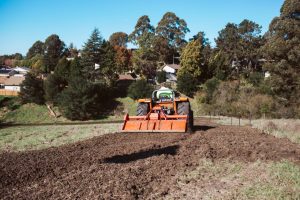 Agroecology Commons, a 1-acre agricultural nonprofit in El Sobrante, CA, grows seasonal vegetables. Their $4918 grant will allow them to enhance their water conservation practices through the installation of drip irrigation, adding bee hives for pollination, and building a hoop house to extend their growing season. The drip irrigation system and beehive establishment will be part of the Bay Area Farmer-to-Farmer Training Program they facilitate that supports local BIPOC, queer, and fem beginning farmers.
Agroecology Commons, a 1-acre agricultural nonprofit in El Sobrante, CA, grows seasonal vegetables. Their $4918 grant will allow them to enhance their water conservation practices through the installation of drip irrigation, adding bee hives for pollination, and building a hoop house to extend their growing season. The drip irrigation system and beehive establishment will be part of the Bay Area Farmer-to-Farmer Training Program they facilitate that supports local BIPOC, queer, and fem beginning farmers.
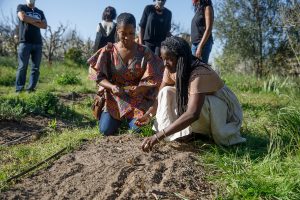 EARTHseed Farm, a certified-organic, solar-powered 14-acre agricultural nonprofit in Sebastopol, CA, grows apples, pears, persimmons, plums, pluots, guavas, mixed berries, herbs, and flowers. They operate and are rooted in AfroIndigenous permaculture principles built on the long legacy of earth wisdom traditions of people of African descent. Their $4,970 grant will allow them to install a rainwater catchment system they expect will provide up to 1,000 gallons of water each year that will be used to irrigate their orchard and become part of educational tours.
EARTHseed Farm, a certified-organic, solar-powered 14-acre agricultural nonprofit in Sebastopol, CA, grows apples, pears, persimmons, plums, pluots, guavas, mixed berries, herbs, and flowers. They operate and are rooted in AfroIndigenous permaculture principles built on the long legacy of earth wisdom traditions of people of African descent. Their $4,970 grant will allow them to install a rainwater catchment system they expect will provide up to 1,000 gallons of water each year that will be used to irrigate their orchard and become part of educational tours.
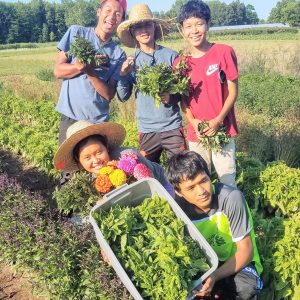 5 Loaves Farm, a 1-acre agricultural nonprofit in Buffalo, NY, provides sustainably-grown fruit, vegetables, honey and maple syrup to residents and opportunities for local youth, immigrants, and refugees to work and grow food. Their $4998 grant will allow them to increase their sustainability by improving soil health, replacing sprinklers with drip irrigation, extending their growing season with a new hoop house, installing pollinator plantings, as well as subsidizing a number of CSA shares for at-risk youth interns and their families.
5 Loaves Farm, a 1-acre agricultural nonprofit in Buffalo, NY, provides sustainably-grown fruit, vegetables, honey and maple syrup to residents and opportunities for local youth, immigrants, and refugees to work and grow food. Their $4998 grant will allow them to increase their sustainability by improving soil health, replacing sprinklers with drip irrigation, extending their growing season with a new hoop house, installing pollinator plantings, as well as subsidizing a number of CSA shares for at-risk youth interns and their families.
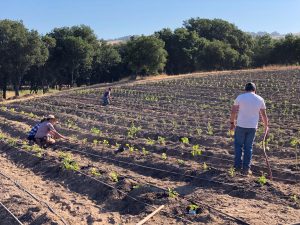 Farm to Fight Hunger, a 2-acre agricultural nonprofit in Healdsburg, CA, donates 100% of everything it grows to fight food insecurity in Sonoma County. They grow culturally-relevant varieties of vegetables including tomatoes, tomatillos, peppers, squash, corn, onions, broccoli, cauliflower, kale, nopales, and Mexican and South American herbs. Having converted an acre of vineyard to vegetable production, their $4,755 grant will allow them to plant a 300-foot long hedgerow of native, drought-tolerant plants, fruit, and nut trees to create habitat for pollinators and other beneficial insects.
Farm to Fight Hunger, a 2-acre agricultural nonprofit in Healdsburg, CA, donates 100% of everything it grows to fight food insecurity in Sonoma County. They grow culturally-relevant varieties of vegetables including tomatoes, tomatillos, peppers, squash, corn, onions, broccoli, cauliflower, kale, nopales, and Mexican and South American herbs. Having converted an acre of vineyard to vegetable production, their $4,755 grant will allow them to plant a 300-foot long hedgerow of native, drought-tolerant plants, fruit, and nut trees to create habitat for pollinators and other beneficial insects.
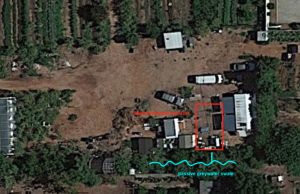 Huerta del Valle is a 10-acre agricultural nonprofit in Ontario, CA that provides community farming plots and a CSA to distribute the fruits, vegetables, and herbs grown there if farmers choose to do so. Their $4,037 grant will allow them to upgrade their produce processing and cleaning station, which will help conserve water, reduce waste, and improve food safety, providing an educational model for emerging farmers. In addition, the shade area will provide a community gathering area for growers, volunteers, and visitors.
Huerta del Valle is a 10-acre agricultural nonprofit in Ontario, CA that provides community farming plots and a CSA to distribute the fruits, vegetables, and herbs grown there if farmers choose to do so. Their $4,037 grant will allow them to upgrade their produce processing and cleaning station, which will help conserve water, reduce waste, and improve food safety, providing an educational model for emerging farmers. In addition, the shade area will provide a community gathering area for growers, volunteers, and visitors.
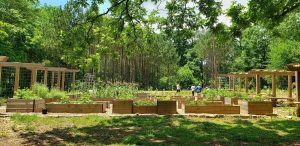 Urban Food Forest at Brown Mill Community Garden is a 1-acre agricultural nonprofit located in a food desert within Atlanta, GA that grows a variety of greens, fruit, beans, herbs, and flowers for neighborhood residents. Their $3,581 grant will conserve water, conserve soil, and improve productivity by replacing hose watering with pre-fabricated irrigation grids for 30 of their 39 raised planting beds. A rain sensor will conserve more water by preventing unnecessary watering. The irrigation grids also reduce the wetting of plant leaves to a minimum, decreasing the chance of disease development & insect infestation.
Urban Food Forest at Brown Mill Community Garden is a 1-acre agricultural nonprofit located in a food desert within Atlanta, GA that grows a variety of greens, fruit, beans, herbs, and flowers for neighborhood residents. Their $3,581 grant will conserve water, conserve soil, and improve productivity by replacing hose watering with pre-fabricated irrigation grids for 30 of their 39 raised planting beds. A rain sensor will conserve more water by preventing unnecessary watering. The irrigation grids also reduce the wetting of plant leaves to a minimum, decreasing the chance of disease development & insect infestation.
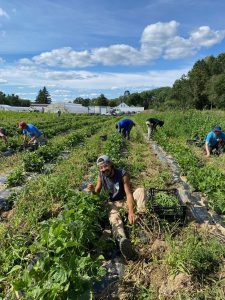 Stonefield Farm of Boston Area Gleaners is a 25-acre agricultural nonprofit in Acton, MA on land that has been farmed for nearly 100 years. Boston Area Gleaners recently purchased the farm to further its mission to support an equitable, just, and sustainable local food system. Their $4,931 grant will allow the purchase and planting of native hydrophilic trees, including willows and red maples, to absorb excess water in areas of poor drainage. Overly wet areas challenge food safety, successful vegetable production, and limit the types of crops that can be planted. In addition, native pollinator plants that thrive in a wet environment will compliment the area.
Stonefield Farm of Boston Area Gleaners is a 25-acre agricultural nonprofit in Acton, MA on land that has been farmed for nearly 100 years. Boston Area Gleaners recently purchased the farm to further its mission to support an equitable, just, and sustainable local food system. Their $4,931 grant will allow the purchase and planting of native hydrophilic trees, including willows and red maples, to absorb excess water in areas of poor drainage. Overly wet areas challenge food safety, successful vegetable production, and limit the types of crops that can be planted. In addition, native pollinator plants that thrive in a wet environment will compliment the area.
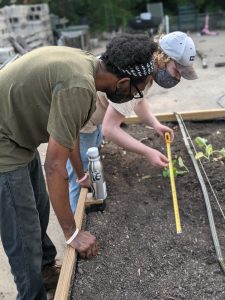 Cooperation Operation, a 2-acre agricultural nonprofit on the south side of Chicago, grows beans, squash, cucumbers, small fruits, peppers, tomatoes, okra, and herbs. The only farm in the area, their mission is to expand the local community’s access to practice sustainable agriculture in an urban context and consume locally-sourced produce. Their $5,000 grant will allow them to purchase a shipping container and coolbot to process and store produce in a food safe environment that allows them to increase the amount of donated produce.
Cooperation Operation, a 2-acre agricultural nonprofit on the south side of Chicago, grows beans, squash, cucumbers, small fruits, peppers, tomatoes, okra, and herbs. The only farm in the area, their mission is to expand the local community’s access to practice sustainable agriculture in an urban context and consume locally-sourced produce. Their $5,000 grant will allow them to purchase a shipping container and coolbot to process and store produce in a food safe environment that allows them to increase the amount of donated produce.
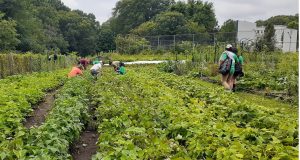 Costello Urban Farm is a 1-acre agricultural nonprofit in Lawrence, MA that provides a year-round program that offers part-time, paid positions for local high school students to plan, grow, and harvest produce; lead local environmental and healthy community initiatives; and challenge their peers to do community service. Their $2,800 grant will repair their broken drip irrigation system allowing for water conservation and prevent soil erosion, unintentional nutrient stripping, excess runoff, and overwatering. The farm’s harvest is donated to local food banks or sent home to youth’s families.
Costello Urban Farm is a 1-acre agricultural nonprofit in Lawrence, MA that provides a year-round program that offers part-time, paid positions for local high school students to plan, grow, and harvest produce; lead local environmental and healthy community initiatives; and challenge their peers to do community service. Their $2,800 grant will repair their broken drip irrigation system allowing for water conservation and prevent soil erosion, unintentional nutrient stripping, excess runoff, and overwatering. The farm’s harvest is donated to local food banks or sent home to youth’s families.
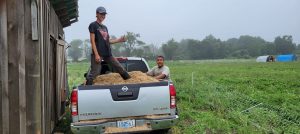 Movement Ground Farm is a 5-acre agricultural nonprofit in Tiverton, RI that grows a wide variety of vegetables, with a special focus on crops catering to South East Asian and Chinese immigrants and refugees, as well as chickens for eggs and meat. Their $4,741 grant will allow them to add 12 Katahdin lambs to their farm for grazing and meat. Lamb is relevant to many immigrant communities and their CSA is the only one in Rhode Island with a majority BIPOC membership base.
Movement Ground Farm is a 5-acre agricultural nonprofit in Tiverton, RI that grows a wide variety of vegetables, with a special focus on crops catering to South East Asian and Chinese immigrants and refugees, as well as chickens for eggs and meat. Their $4,741 grant will allow them to add 12 Katahdin lambs to their farm for grazing and meat. Lamb is relevant to many immigrant communities and their CSA is the only one in Rhode Island with a majority BIPOC membership base.
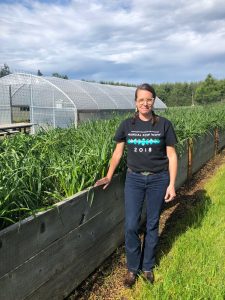 Sakari Farms is a 3-acre tribal food and education farm in Bend, OR. They will use their $1,086 grant to build raised growing beds for a demonstration garden to grow Camas, Wapato, and Makah potatoes for harvest and educational purposes. These root-based native and traditional plants are a main food source, seasonal staple, and of high importance to ceremonial events and systems in the region. These traditional root crops are often difficult to access in the natural setting and the beds will have educational signs and provide an opportunity for hands-on demonstrations throughout the seasons.
Sakari Farms is a 3-acre tribal food and education farm in Bend, OR. They will use their $1,086 grant to build raised growing beds for a demonstration garden to grow Camas, Wapato, and Makah potatoes for harvest and educational purposes. These root-based native and traditional plants are a main food source, seasonal staple, and of high importance to ceremonial events and systems in the region. These traditional root crops are often difficult to access in the natural setting and the beds will have educational signs and provide an opportunity for hands-on demonstrations throughout the seasons.
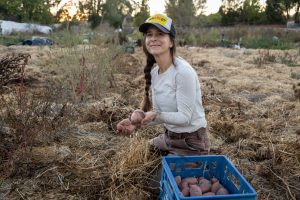 Red H Farm, a 2-acre farm in Sebastopol, CA, is grounded in the agroecological ethics of growing soil, conserving water, fostering biodiversity, cultivating community and building equity. While the majority of their land is dry-farmed, climate change issues such as California’s ongoing drought, wildfires, and extreme heat have prompted them to expand the portion of the farm using drip irrigation. They will use their $5,000 grant to expand their drip irrigation system to support production for their sliding-scale winter CSA program, establish perennial edible and pollinator-focused hedgerows, and a caterpillar tunnel.
Red H Farm, a 2-acre farm in Sebastopol, CA, is grounded in the agroecological ethics of growing soil, conserving water, fostering biodiversity, cultivating community and building equity. While the majority of their land is dry-farmed, climate change issues such as California’s ongoing drought, wildfires, and extreme heat have prompted them to expand the portion of the farm using drip irrigation. They will use their $5,000 grant to expand their drip irrigation system to support production for their sliding-scale winter CSA program, establish perennial edible and pollinator-focused hedgerows, and a caterpillar tunnel.
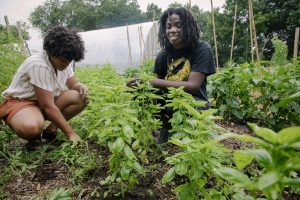 Philly Forests is a 3-acre farm in northwest Philadelphia, PA, that uses sustainable and regenerative growing practices to produce greens, peppers, tomatoes, allium, plums, strawberries, blackberries, and herbs. They operate a philanthropic Urban Ecology Program where they use a percentage of crop revenue to purchase trees, shrubs, and perennials to distribute for free to residents living in Philadelphia’s lowest canopy areas, generally lower-income, BIPOC-populated neighborhoods. Their $2,800 grant will allow them to establish an irrigation system in their tree and native plant nursery instead of watering by hand. This will save water and labor time as well as promote plant health, providing healthier saplings to their Urban Ecology recipients, ensuring healthy establishment of tree roots and combating the urban heat island effect.
Philly Forests is a 3-acre farm in northwest Philadelphia, PA, that uses sustainable and regenerative growing practices to produce greens, peppers, tomatoes, allium, plums, strawberries, blackberries, and herbs. They operate a philanthropic Urban Ecology Program where they use a percentage of crop revenue to purchase trees, shrubs, and perennials to distribute for free to residents living in Philadelphia’s lowest canopy areas, generally lower-income, BIPOC-populated neighborhoods. Their $2,800 grant will allow them to establish an irrigation system in their tree and native plant nursery instead of watering by hand. This will save water and labor time as well as promote plant health, providing healthier saplings to their Urban Ecology recipients, ensuring healthy establishment of tree roots and combating the urban heat island effect.
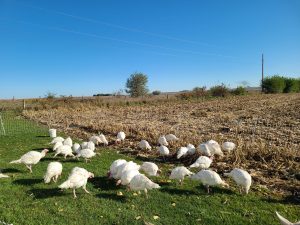 Over the Moon Farm & Flowers, a 4-acre farm in Coggon, IA run by two young queer women farmers, grows cut flowers and humanely-raised chicken, turkey, pork, beef, and eggs sold through their CSA. Their $5,000 grant will allow them to purchase electric poultry net fencing and the planting of trees, perennial flowers, and shrubs for a windbreak that will double as future habitat for their pasture-based poultry. This project will also provide shade and forage for their poultry, increasing natural behaviors, provide wind protection for their soil and cut-flowers, and increase the farm’s profitability. Hedgerows also offer a buffer to filter dust, chemical drift, and livestock diseases from neighboring farms.
Over the Moon Farm & Flowers, a 4-acre farm in Coggon, IA run by two young queer women farmers, grows cut flowers and humanely-raised chicken, turkey, pork, beef, and eggs sold through their CSA. Their $5,000 grant will allow them to purchase electric poultry net fencing and the planting of trees, perennial flowers, and shrubs for a windbreak that will double as future habitat for their pasture-based poultry. This project will also provide shade and forage for their poultry, increasing natural behaviors, provide wind protection for their soil and cut-flowers, and increase the farm’s profitability. Hedgerows also offer a buffer to filter dust, chemical drift, and livestock diseases from neighboring farms.
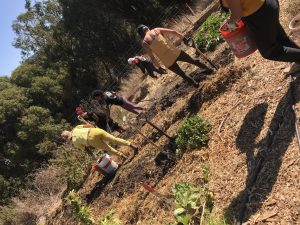 Soulflower Farm, is a 2-acre organic-certified biodynamic permaculture farm in El Sobrante, CA that also teaches herbal medicine and permaculture design. They will use their $4498 grant to establish a rainwater catchment system; improve their compost system; bring sheep and goats into their diversified farm to demonstrate a closed loop animal system; add 10 beehives to add beekeeping to their BIPOC permaculture and beginning farmer trainings; and purchase 100 egg-laying chickens to use for integrated pest management in our fruit orchards and for sale of eggs.
Soulflower Farm, is a 2-acre organic-certified biodynamic permaculture farm in El Sobrante, CA that also teaches herbal medicine and permaculture design. They will use their $4498 grant to establish a rainwater catchment system; improve their compost system; bring sheep and goats into their diversified farm to demonstrate a closed loop animal system; add 10 beehives to add beekeeping to their BIPOC permaculture and beginning farmer trainings; and purchase 100 egg-laying chickens to use for integrated pest management in our fruit orchards and for sale of eggs.
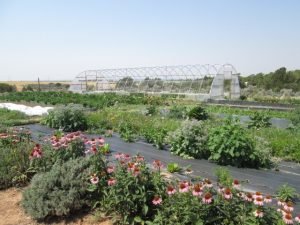 SongHaven Farm, is a 4-acre farm in Cahone, CO that grows over 30 varieties of vegetables, herbs, flowers, and raises egg laying chickens and dairy goats. Their $5,000 grant will help build an energy efficient underground greenhouse known as a Wallipini. This structure will utilize passive solar design principles and upcycle materials for its construction. The farm has seen increases in wind pressure over the last ten years that has made growing more challenging, with soil temperatures staying cooler longer, plants suffering, and regular high tunnel damage. This will be the first Wallipini built in the area for commercial use. As a semi-underground structure, the Wallipini will conserve water, provide wind protection, and take their closed loop farm system to the next level by housing our vermicomposting operation.
SongHaven Farm, is a 4-acre farm in Cahone, CO that grows over 30 varieties of vegetables, herbs, flowers, and raises egg laying chickens and dairy goats. Their $5,000 grant will help build an energy efficient underground greenhouse known as a Wallipini. This structure will utilize passive solar design principles and upcycle materials for its construction. The farm has seen increases in wind pressure over the last ten years that has made growing more challenging, with soil temperatures staying cooler longer, plants suffering, and regular high tunnel damage. This will be the first Wallipini built in the area for commercial use. As a semi-underground structure, the Wallipini will conserve water, provide wind protection, and take their closed loop farm system to the next level by housing our vermicomposting operation.
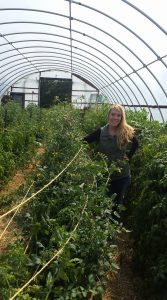 Carlson’s Island View Orchard, is a fifth-generation farm in Sister Bay, WI. The first cherry trees were planted in 1915 and the farm offers a popular You-Pick program featuring fruit, strawberries, plums, tomatoes, and pumpkins. Their $3,359 grant will allow them to replace their drip irrigation system, repair their hoop house, purchase strawberry and raspberry plants to diversify their crops, and establish native Mason bee colonies for pollination.
Carlson’s Island View Orchard, is a fifth-generation farm in Sister Bay, WI. The first cherry trees were planted in 1915 and the farm offers a popular You-Pick program featuring fruit, strawberries, plums, tomatoes, and pumpkins. Their $3,359 grant will allow them to replace their drip irrigation system, repair their hoop house, purchase strawberry and raspberry plants to diversify their crops, and establish native Mason bee colonies for pollination.
Celebrating 10 Years
2022 marks the tenth anniversary of The FruitGuys Community Fund, a fiscally-sponsored non-profit project of Community Initiatives. From 2012-2021, the Community Fund has awarded 105 grants totaling more than $412,000 dollars to small-scale U.S. farmers in more than 30 states for sustainable agriculture projects that have large positive impacts on the environment, local food webs, and farm diversity.
FruitGuys Community Fund Grants 2012-2022 At a Glance:
- 105 farms & agricultural nonprofits
- 30+ states represented
- 1,367 acres supported
If you’d like to keep up with these farms throughout the year, be sure to sign up for our newsletter!
Small farmers are masters at making every dollar count. They are important stewards of the land and growers of sustenance for us all. By providing farms like these with grants, we’re able to make big impacts on farming, communities and environmental outcomes throughout the United States. If you’d like to join the FruitGuys in supporting small farms, please donate to our Help Farms, Help Our Planet Campaign.
